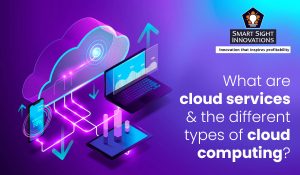 Synopsis: Cloud services refer to a range of services provided on-demand to companies and customers over the internet. These services provide easy and affordable access to applications and resources, without the need for internal infrastructure or hardware.
Synopsis: Cloud services refer to a range of services provided on-demand to companies and customers over the internet. These services provide easy and affordable access to applications and resources, without the need for internal infrastructure or hardware.
Most employees use cloud services for checking email and collaborating on documents. Cloud services are managed entirely by cloud computing service providers. They are made available from the providers’ servers, reducing a company’s need to host applications on their on-premises servers.
Cloud services are infrastructure, platforms, or software hosted by third-party providers and made available through the internet. It facilitates the data flow from front-end clients like users’ servers, tablets, desktops and laptops through the internet, to the provider’s systems, and back.
Cloud computing services provide a cost-effective solution for businesses to enhance their IT capability and functionality. Exploring the different types of cloud services and cloud computing options could lead to a better understanding of the concept.
Types of Cloud services
There are three main service models of cloud computing that are currently in use – Infrastructure as a Service (IaaS), Platform as a Service (PaaS) and Software as a Service (SaaS). Another rapidly emerging feature is Function as a Service (FaaS).
There are differences between them and what they can offer to businesses in terms of storage and resource pooling. But they can also interact with each other to form a comprehensive cloud computing model.
IaaS or Infrastructure as a Service
It is the most common service model of cloud computing that offers the basic infrastructure of virtual servers, networks, operating systems and data storage drives. This allows flexibility, reliability and scalability that many businesses want with the cloud.
It eliminates the need for hardware in the office. It is ideal for small and medium-sized organizations looking for cost-effective IT solutions to support business growth. IaaS is a fully outsourced paid-to-use service available as a public, private or hybrid infrastructure.
Benefits of IaaS cloud computing service
- An infrastructure that saves time and money as the underlying hardware setup and support is provided by the service provider.
- Resources are available on-demand as and when required so there is no wastage of any unused resources and there is no delay in adding any resource.
- It is a utility-based pricing model as you pay only for the resources that you use.
PaaS or Platform as a Service
Here, cloud computing providers deploy the infrastructure and software framework, but businesses can develop and run their applications. Web applications can be built quickly and easily through PaaS, and the service is flexible and robust enough to support them.
PaaS solutions are scalable and ideal for business environments where multiple developers are working on the same project. It is also useful for situations where there is a need to leverage existing data sources, such as CRM tools.
Benefits of PaaS cloud computing service
- PaaS makes software development easy even for beginners with its single-click functionality.
- There’s no need for users to upgrade the infrastructure as the PaaS service provider handles all the updates, upgrades and routine software maintenance.
- PaaS provides location independence because developers in different locations can work together on the same application build.
- No need to invest in physical infrastructure or the expertise required to manage it. The ability to rent virtual IT infrastructure offers a cost benefit to users.
SaaS or Software as a Service
This cloud computing solution involves the deployment of software over the internet for various businesses that pay through a subscription or pay-per-use model.
It is a valuable tool for CRMs and for applications that require web or mobile access, such as mobile sales management software. As SaaS is managed from a central location, businesses don’t have to worry about maintaining it themselves. It’s ideal for short-term projects.
Benefits of SaaS cloud computing service
- No initial setup cost as users can use the application as soon as they subscribe.
- Also, no hardware cost as the processing power is supplied by the service provider.
- Users pay for services on a pay-as-you-go model in the form of flexible payments.
- Any update to the software is automatic and free.
- It provides cross-device compatibility because SaaS applications can be accessed through any internet-enabled device, such as a laptop, smartphone, or desktop.
FaaS or Function as a Service
It is a new and emerging cloud computing service that acts as a game-changer for many businesses. It is a serverless computing concept that lets software developers develop applications and deploy action to an individual function without maintaining a server.
Benefits of FaaS cloud computing service
- FaaS code is inherently scalable and fault-tolerant.
- Money is not spent on idle resources because users are billed on the amount of functionality used.
- Makes developers efficient because they can focus more on writing application-specific logic rather than dealing with server logistics.
Different types of cloud computing
The different types of clouds that are available can provide different capabilities. There are three main types of cloud computing:
Public cloud
The public cloud means a vast range of readily available computer resources such as networking, memory, central processing unit (CPU) and storage. All resources are hosted in one of the public cloud vendor’s global and fully managed data centers.
These computer resources are combined with managed services such as database servers, applications, and security systems. You can rent these managed services if you do not want the hassle of setting up and managing the entire solution.
Accessing your resources in this type of cloud is as easy as using a web browser.
Benefits of Public cloud
- The underlying hardware and logic are hosted, owned and maintained by the vendors. Customers need not purchase or maintain the physical components for their public cloud IT solutions.
- The pay-as-you-go model makes it a cost-effective solution. The ability to scale to the size of your solution saves the customer money and allows flexibility.
- Security is guaranteed. Public cloud vendors provide fault-tolerant power supplies, network paths, storage facilities, and automated monitoring and maintenance systems.
Private cloud
As the name suggests, private clouds are owned and used by single private businesses and organizations. They have traditionally been physically located in the business’s own data center, using their hardware.
Additionally, a business can hire a third-party provider to host its private cloud on its kit. In this case, the private cloud has some similarities to the public cloud, as the resources are in a remotely managed data center.
Benefits of Private cloud
- With a private cloud, there is the benefit of being able to fully control the entire solution yourself.
- You can tailor your cloud computing approach to your preferences and internal processes.
Hybrid cloud
True to its name, a hybrid cloud is a combination of public and private cloud elements securely connected over the internet by a virtual private network (VPN) or a dedicated private channel.
For example, you can use the nearly unlimited storage capacity of the public cloud for storage, while data processing can take place on your premises. Or you can extend your computer network to the cloud to save yourself from buying additional permanent hardware.
Benefits of Hybrid cloud
- It benefits from both options. If you have exhausted your on-premise computing capabilities, it can be supplied by the public cloud. It is a cost-effective way for businesses to increase computing capacity on demand while using already paid for on-premises resources.
Conclusion
Based on specific needs, businesses can choose where, when and how they use cloud computing to ensure efficient and reliable IT solutions.
Businesses can benefit from cloud computing services because they help improve efficiency and cut costs. They can adopt one or more cloud computing services based on their needs, areas of expertise, business processes and other preferences.
When choosing a cloud computing service it is wise to research thoroughly to understand the business requirements and find providers who can provide the desired cloud solutions that can work perfectly depending on your specific requirements.













